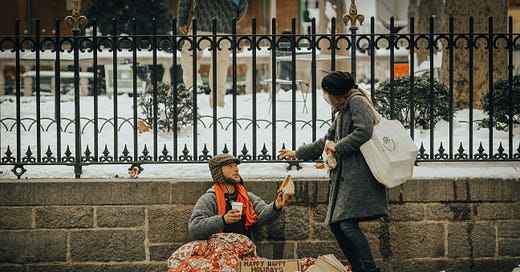Do you give to panhandlers? Disheveled ones? Clean ones? Ones with kids or dogs? Do you give to teenaged gutter punks? Are you one of those hyper-organized people who carry around paper bags full of disposable razors, clean socks, and bottled water? (Seriously, how?!)
Living in a city rife with homelessness, I often debate whether I should give to panhandlers. Is it better to support homeless charities instead? How do I know whether this person will use my money towards good ends? I don’t want to unwittingly contribute to someone OD’ing on Fentanyl, neither do I want to assume that panhandlers are all addicts. When I lived in Europe, there were rumors that organized crime rings purposely maimed panhandlers because beggars with obvious deformities earned more money. Does giving money to such a person encourage these supposed practices?
I think it’s only natural (and very Utilitarian of us) to wonder about the knock-on effects of our actions. Then again, maybe it’s saner to control what we can—our decision to give or not—and let go of what we can’t: what the recipient chooses to do with that gift.
All this brings The Good Samaritan to mind. To me, this story is central to Christianity and what it means to live ethically. To recap, a legal expert quizzes Jesus on how to attain eternal life. The response is to love God and to love your neighbor as yourself. But when the legal expert asks, “Who is my neighbor?” Jesus doesn’t give a direct answer but rather tells the story of a man who is beaten, robbed, and left for dead by the side of the road. Two religious figures pass by, ignoring the man’s suffering, but a Samaritan (a member of a despised ethnic group) stops to help the beaten man.
In this parable, Jesus answers questions by asking more questions. The only instruction he gives is, “Go and do likewise.” For someone looking for practical advice, it’s a frustrating command. Do likewise when? Where? For whom? Jesus can’t possibly mean for everyone, right? I wouldn’t be able to maneuver the city if I stopped to help each homeless person along the way.
One of my favorite pastors used to say, “Never resist a generous impulse.” A nice idea, but pretty challenging to implement. I want efficient giving. I want prescheduled, automatic donations, followed by a tax receipt at the end of the year.
But I am learning that generosity sometimes means work. This month, I’ve been trying to give away one thing every day—sometimes money, sometimes household items. It can be a time-consuming process.
Last week, three of my gifts were requested by a prolific BuyNothing-er in my neighborhood who I worry might be a hoarder. I agonized a bit about whether to give to her, but ultimately opted to let go of control. If she does have a hoarding problem, I’m going to trust that there are people in her life who can help.
Later that same day, I found myself in the grocery store checkout line behind a mom with a new baby. I was smiling at the newborn when the cashier chimed in, “It says ‘WIC account not found.’” The mom looked at her groceries: a pack of diapers and a few cans of Similac. She picked up one can of formula and asked to put it back. Without hesitating, I offered to pay for her groceries. It felt, unquestionably, like the right thing to do.
I don’t say this to paint myself in some heroic light. I didn’t feel heroic. I felt awkward and angry—angry that America can’t get its shit together enough to create a basic social safety net for families. Angry about income inequality and guilty that I benefit from it. As childish as it may sound, I still want the world to be fair.
I’m angry because issues like homelessness and poverty can’t be solved by us well-intentioned individuals wringing our hands over whether to give $5 to a panhandler or not. These are systemic problems that require big, systemic solutions. They require us to vote, organize, and build better institutions. Meanwhile, the current administration is intent on dismantling our government programs to sell to the highest bidder.
And yet.
And yet, giving is not nothing. It blesses the recipient; it also blesses the giver. Giving helps us right-size our view of our possessions—as something to be held loosely. It reminds us that our real riches aren’t in our bank accounts, they’re in our relationships. In our age of mass consumption, any type of generosity—planned or impulsive, is indeed a good thing.
How do you determine whom to give to? Do you give to panhandlers? As always, your thoughts and questions are welcome in the comments!
Program note: we’re off next week for spring break. Until then, wishing a Happy Passover and Easter to all who celebrate.





Life must be really difficult if asking for money on the street is someone’s reality, so whether it’s spent to get some temporary relief from their situation (drugs) or on food is irrelevant to me. That $5, $10, or $20 isn’t changing their life circumstances. What’s done with the money is none of my business because it’s no longer mine.
I decided some time ago that the act of giving was challenging enough for me, that if I had it (cash, mostly) when asked, I should give. I haven't always been consistent in practice, and frankly I have cash less and less (yay to Real Change and their QR code payment system), but it does do something to my brain to just let go the analysis and respond out of the privilege of my capacity.